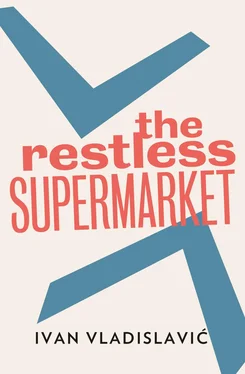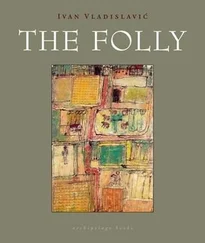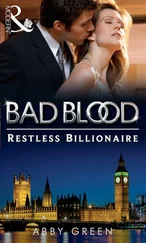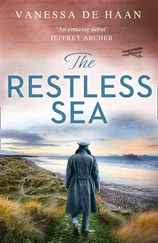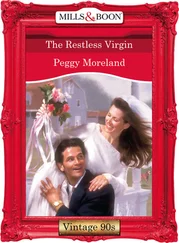The menu was always out of date. I had long since acquired a taste for Vienna schnitzel and Parma ham, but these old standards slipped from view. On any day of the week, the kitchen was liable to throw up an entirely new range of dishes, nouvelle cuisines that did not agree with me any more than I agreed with them. Savoury tarts, for instance, which the unsavoury ones demanded for the sake of their waistlines; only to change their minds the next day and insist on ‘fatcakes’ stuffed with mincemeat, and acidulous stews for macerating stiff porridges. Chicken reared its ugly head. ‘Supply must meet demand,’ Mrs Mavrokordatos said, and Mevrouw Bonsma assented.
To keep up my strength, I turned once again to the international restaurants of Hillbrow, combining these visits when I could with public-service proofreading. I remember crossing spoons with a waiter in a so-called Pizzaghetti Factory one evening. ‘Pizzaghetti? Factory? It’s the nadir of poor taste. And “farinaceous” is stretching a point. I would say “farraginous”. From the Latin far , corn. Are you with me? You should serve this stuff in a nosebag.’
Milksop ran for the manager.
Never fear, I gave them both a talking-to about their macaronic menu, and especially the ‘Quattro Stagione’, which was nothing more than a ‘Four Seasons’ in plain English, the garden-variety winter, spring, summer and autumn. I wanted to know which of the seasons was represented by which of the ingredients. They didn’t have a clue. I had to tell them !
‘The way I see it, the ham is autumn leaves. The mushrooms, the dead wood of winter. The olives are the ripe fruits of summer. But why artichokes? Not nearly vernal enough. I would have had little budding capers. I’ve been tempted to cut a caper myself when spring comes. Never succumbed, mind you.’
Do you suppose they understood a word I said?
No more than Fräulein Schrenke, proprietress of the Potato Kitchen, when I pointed out that a conspicuous lack of ambience was ruining her business. ‘You need to colour these bare walls with an artwork or two. Something to warm the place up a bit.’
‘Like what?’
I did not usually have such information at my fingertips, but I had spent the morning in the library doing some research, and so I was able to flourish a shortlist. ‘Perhaps the “Battle between Carnival and Lent” by Pieter Bruegel. Or Adriaan van Ostade’s “A Room with Many Figures”. Or even — the simplest ideas are often the best — “The Potato Eaters”.’
‘Hungarians?’
‘Hollanders, I suppose.’
I put a photostatic reproduction of the work down on the counter. Made at my own expense. My pick of the three was the Van Ostade, but the Van Gogh also had something of Alibia in it. It might have been a wayside eatery on one of those Alibian country roads that bends away from the sea into the hinterland.
‘Die Kartoffelesser. Where should I buy such a thing, Mr Tearle?’
‘Who said anything about buying? You’ll employ someone to make a copy for you, faithful in all the essentials. This wall here is crying out for a fresco.’
‘I am not an associate of artists.’
‘I know just the person. A fräulein like yourself, an art student, whom Mrs Mavrokordatos engaged to do some decorating at the Café Europa.’
Using nothing but brushes and tubes, this person, who was much given to paint-spattered dungarees, had transformed the windows of the cubicle containing the one-armed bandits into something resembling stained glass. On closer examination, her tableaux proved to be depictions of bloody carnage and mindless vandalism. They disgusted me at first, but in time I came to appreciate their efficacy. In the door to the ‘chapel’ — a door that shut itself with the aplomb of a commissionaire, thanks to a spring-loaded elbow — was a lozenge of glass that had escaped the artist’s attentions. I could never look through that clear pane, at the men and women attached to the machines inside, the air around them aswirl with smoke, without being reminded of a gas chamber. Throw in Bogey and Zbignieuw and their ilk, and the effect was uncannily lifelike. It was better by far to gaze through the fake stained glass, to fit one’s eye to a block of blue sky above a blazing cottage or to a patch of grass beside the bloodied smock of a ravaged peasant, and view the world through a glaze of unreality.
‘I have the young lady’s telephone number here in my notebook.’
But Fräulein Schrenke was blunt. ‘It is a Fata Morgana,’ she said. ‘My business is going downstream. Black people are eating porridge more than potatoes. I cannot spend money on nonsenses.’
The Fräulein’s assistant, a youngster with shell-shock and eczema, banged a polystyrene casket down on the counter. ‘Need some tools?’
I gathered he meant a knife and fork.
I have always liked the Germans. I admire their discipline. Which made the collapse of order in their fatherland all the more shocking. I was passing a lot of time with Herr Toppelmann in those days. As I’ve mentioned, I was in the Wurstbude, eating a Bratwurst off my personalized crockery, when the Berlin Wall came tumbling down.
‘It is well,’ Herr Toppelmann said, ‘now Europe is again one.’ And he made a pretzel of index and middle fingers to demonstrate the union.
I supposed he was right. I was as glad as anyone to see the Iron Curtain fall. But hadn’t the East always been a source of conflict and corruption in Europe? Wasn’t there a crooked line between that infamous Bosnian Gavrilo Princip and the Slobodan Boguslavićes of the world? A line drawn in blood and therefore indelible. One hoped this German business didn’t lead to a licentious collapsing of borders everywhere. There was never a shortage of volunteers to wield the sledgehammer. People were so delighted to see things fall down, to see the boundaries effaced and the monuments toppled, and to greet every fall with wild jubilation. In our own towns and cities, in every little Jericho on the veld, the mobs were on the march, exercising their God-given right to go in procession through the streets. When you scrutinized it properly, it was more like prancing. Lifting up their knees like a bunch of Mother Browns. ‘Long leave! Long leave!’ Nothing must continue, everything must change. Great gouts of change came sluicing out of the television set, to make up for the petty trickle from the one-armed bandits. Mevrouw Bonsma breathed deeply and played on, but she sank nonetheless beneath the polluted airwaves.
What did I think of all this? Herr Toppelmann wanted to know.
Frankly?
But of course.
Frankly, I found it struthious. That’s S-T-R-U-T-H-I-O-U-S. Of or like an ostrich, of the ostrich tribe. From the Latin struthio . From the Greek strouthos , sparrow. Out of proportion, but there you are.
The dust had hardly settled in Germany before the rubble of the Berlin Wall was up for sale. One of Bogey’s country cousins arrived with a piece of it in his luggage, a bit of brick and a layer of paint-smeared plaster. Muggins had paid fifteen marks for it, according to the cardboard container, which also had a picture purporting to show that the paint was a scrap of the garish babble with which the entire wall had been coated. The Western side, that is. It reminded me of the old scouting trick: you could always find your bearings by determining which side of the tree trunk had gathered moss.
Bogey was all for launching the product on the ‘domestic market’. He had picked up the phrase at the Small Business Development Corporation (which he had begun to frequent almost as religiously as Benjamin Goldberg’s), and he said he would find his ‘capital’ there too. When I pointed out that shipping rubble from Europe could prove costly, he said he wasn’t that stupid. Half of Johannesburg was in ruins. He would scavenge his merchandise at the Civic Theatre.
Читать дальше
